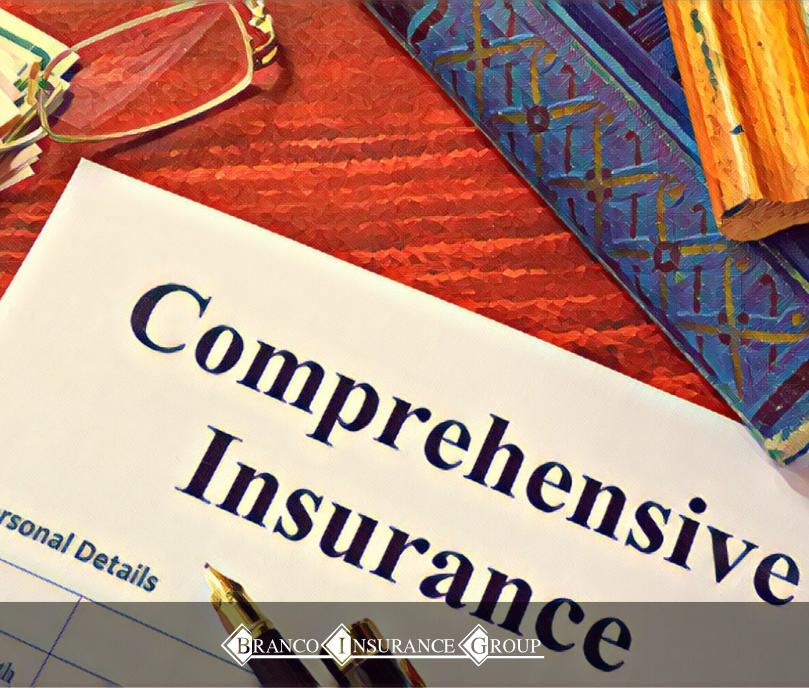
How Employees Can Help Reduce Cybersecurity Risks
Many small businesses conduct themselves directly online. Having employees who are not properly trained in cybersecurity can increase the risk of a cyberattacks. Adequate cybersecurity

Comprehensive insurance is a type of coverage that can help protect you from financial losses if your car is damaged or stolen. This type of insurance typically costs more than basic liability coverage, but it can provide much-needed peace of mind if something happens to your vehicle. Comprehensive insurance covers a variety of potential damages, including fire, theft, vandalism, and natural disasters. If you’re considering buying comprehensive auto insurance, here’s what you need to know.
You may have heard of comprehensive insurance, but do you know what it covers and how it can benefit you? Comprehensive insurance is a type of auto insurance that helps pay to repair or replace your car if it’s stolen or damaged in an incident that’s not a collision. That means if your vehicle is hit by a deer, vandalized, or damaged by severe weather, comprehensive insurance can help pay for the repairs.
Let’s take a closer look at some of the benefits of comprehensive insurance.
1. Helps Pay for Unexpected Damages: Accidents can still happen even if you’re the safest driver on the road. And if they happen to involve your car, they can be expensive. That’s where comprehensive insurance comes in. If your vehicle is damaged in an accident that’s not your fault, comprehensive coverage can help pay for the repairs. That way, you’re not left footing the entire bill.
2. May Be Required by Your Lender: If you’re financing your car, your lender will likely require you to have comprehensive and collision coverage during the life of your loan. That’s because the lender wants to protect their investment in case of an accident. So, if you’re financing your car, consider the cost of comprehensive insurance when budgeting for your monthly payments.
3. Offers Peace of Mind: No one likes thinking about worst-case scenarios, but accidents do happen. And if yours involves damage to your car, it could be costly. With comprehensive coverage, you’ll have peace of mind knowing that you’re financially covered if something happens to your car.
Comprehensive insurance can offer valuable protection for your car—and peace of mind for you. If you’re financing your car, your lender may even require it. So if you don’t already have comprehensive insurance, it may be worth considering as part of your auto insurance policy.
Deciding whether or not to purchase comprehensive insurance can be a confusing and daunting task. There are a lot of variables to consider, and it can be challenging to determine what kind of coverage you need.
It’s important to note the difference between collision and comprehensive insurance. Collision insurance covers damage to your car that is caused by a collision with another object, such as another car or a guardrail. Comprehensive insurance, as we’ve discussed, covers damages that are not caused by collision.
The answer to this question depends on a few factors. The first is the value of your car. If your car is old and not worth very much, it may not make sense to purchase comprehensive insurance because the premium cost may exceed your car’s value.
Another factor to consider is your location. If you live in an area with a high risk of floods or other natural disasters, it may be wise to purchase comprehensive insurance to protect yourself against damages that these events could cause.
The final factor to consider is your deductible. A deductible is the amount of money you would have to pay out-of-pocket in case of a claim. For example, if you have a $500 deductible and your car sustained $1,000 in damages, your insurer would pay $500, and you would be responsible for paying the remaining $500.
Choosing a deductible is a personal decision and should be based on how much you are willing and able to pay out-of-pocket in case of a claim. If you choose a high deductible, your premium will be lower, but you will have to pay more if you do need to make a claim. If you choose a low deductible, your premium will be higher, but you will have fewer out-of-pocket costs if you do need to make a claim.
When deciding whether or not to purchase comprehensive insurance, there are several factors that you should take into consideration, including the value of your car, where you live, and what kind of deductible you are comfortable with. Ultimately, the decision comes down to identifying how much financial risk you are willing to take on if something happens to your car.
Comprehensive insurance is one of the four types of car insurance coverage. It is sometimes called “other than collision” coverage. As the name suggests, comprehensive insurance covers damages to your car that are not caused by collision. This can include damages from weather, theft, fire, and more. So, how much does this type of coverage cost? Let’s take a look.
On average, comprehensive insurance costs $1,771 per year or $148 per month. This is the average cost of comprehensive insurance coverage in the United States. However, your specific rate will be determined by several factors, including your car’s make and model, driving history, age, where you live, and more.
Some people choose to add comprehensive insurance to their existing auto insurance policy for an additional premium. Others purchase it as a standalone policy. You can also get comprehensive insurance through your dealership when you buy a new car. Some lenders may require you to have this type of coverage if you finance your vehicle.
Comprehensive insurance covers a wide range of damages to your vehicle. This can include damages from weather events, fire, theft, vandalism, and more. In some cases, it can even cover damage from hitting an animal while driving. If you have comprehensive insurance and your car is damaged by one of these events, your insurer will help pay to repair or replace your vehicle.
When purchasing any insurance coverage, you must consider what you need and can afford. For comprehensive insurance, consider the types of damages that are most likely to occur where you live and whether or not you feel comfortable with self-insuring for those risks. It would be best if you also compared rates from different insurers to find the best value for your specific needs.
There are a few different factors that determine whether you need comprehensive insurance. The first factor is the value of your car. If your vehicle is not worth very much money, it might not be worth it to get comprehensive insurance because the premium might be more than the value of your car.
The second factor is your deductible. Your deductible is the amount of money you must pay before your insurance company starts paying for damages. If you have a high deductible, getting comprehensive insurance might not be worth it because you would have to pay most of the costs yourself anyway.
The third factor is your location. If you live in an area with a high crime rate, you might want to consider getting comprehensive insurance because there is a higher chance that your car will be stolen or vandalized.
The fourth and final factor is your driving record. If you have a bad driving record, insurers may require you to get comprehensive insurance to insure you.
These are just a few factors to consider when deciding whether or not to get comprehensive insurance. Ultimately, the decision comes down to personal preference and risk tolerance.
Comprehensive insurance is an optional coverage that can protect your car in the event of an accident or other damage beyond your control. It may not be necessary for every driver, but it can offer valuable peace of mind if you have a newer car with expensive parts and repairs. Even if you don’t drive often, comprehensive insurance can give you the extra coverage you need in case of an accident or theft.
Comprehensive insurance covers damage caused by events such as fire, hail, flood, vandalism, and theft. It also covers damage from hitting animals and objects like trees or utility poles. Most comprehensive policies will pay for repairs to your car up to its actual market value, less your deductible. In some cases, it can even cover repairs if the vehicle is totaled (beyond repair) due to a covered incident.
The critical question is whether comprehensive insurance is worth the cost for every driver. While it may make sense for someone with an expensive, newer model car or one who drives frequently, others may be able to get by with just the state-required liability coverage. That said, if you’re concerned about protecting your car and want to limit out-of-pocket expenses in the event of a covered loss, comprehensive insurance may be worth considering.
Understanding all your insurance coverage options is essential, no matter what kind of vehicle you drive or how frequently you use it. If you need clarification on whether comprehensive insurance makes sense for your situation, talk to your insurance agent about the risks in your area and any discounts or special deals you may qualify for.
Ultimately, making an informed decision about car insurance can help ensure that you have the right coverage at the most affordable cost. A little research and preparation now can help you save money and give you extra peace of mind when something goes wrong.
1. Contact your insurance provider as soon as possible after the accident to begin the claims process. Your agent will provide you with instructions on filing a claim and explain what documentation is needed to proceed.
2. Gather all documents related to the accident, including police reports, medical bills, repair estimates, and any other relevant paperwork.
3. Submit your claim with the insurance company as soon as you have all of the necessary documents. Your insurer will review the information provided and contact you if they need additional documentation or clarification.
4. Schedule a meeting with an adjuster to discuss the details of your claim. The adjuster will assess the damages and determine how much you are entitled to.
5. Get estimates from repair shops for fixing the damage done to your vehicle. You may be able to negotiate a lower rate with the shop of your choice, but keep in mind that your insurance company will cover any difference.
6. Follow up with your insurance provider on the status of your claim. In most cases, you should be able to track the progress online or by calling customer service.
7. Once your claim is approved and processed, payments will be made according to the terms of your policy. Your insurance company may pay out a lump sum or provide regular payments over time.
8. Be sure to keep records of all communication with your insurance company and follow up if there are any payment delays.
9. Follow the instructions provided by your insurer for evaluating repair shops and completing repairs on your vehicle. This process may involve taking your car to an approved shop or having a representative from the insurance provider come out for an inspection.
10. Once all repairs are completed, contact your insurer to ensure the claim is closed, and you have received full payment for the damages. Your finished claim will also be reported to any necessary government agencies. Keep copies of all documents related to your claim for future reference. Contact your provider for assistance if you have any further questions about filing a comprehensive car insurance claim. They can provide more details and help ensure the process goes smoothly. Knowing the steps in advance will make it easier to file a successful claim and get your vehicle repaired quickly.
In short, comprehensive insurance is auto insurance that helps pay to replace or repair your car if it’s stolen or damaged in an incident that’s not a collision. Some benefits of having comprehensive coverage include peace of mind, protection for your investment, and potentially saving money on your overall car insurance premiums. You may want to consider adding comprehensive coverage to your auto insurance policy if you live in an area with a high incidence of vehicle theft or drive an expensive car. When determining whether or not to add comprehensive coverage, weigh the costs and potential risks involved. If you decide to purchase comprehensive insurance, ensure you understand how to file a claim should the need arise. If you still have questions about comprehensive insurance, our auto insurance experts at Branco Insurance Group would love to help you. Contact us today for a free quote. We’re here to ensure you have the best coverage available at an affordable price.

Many small businesses conduct themselves directly online. Having employees who are not properly trained in cybersecurity can increase the risk of a cyberattacks. Adequate cybersecurity

Because seasonal changes affect your vehicle in a multitude of ways, it’s important to prepare for the transition from summer to fall. You’ll want to
